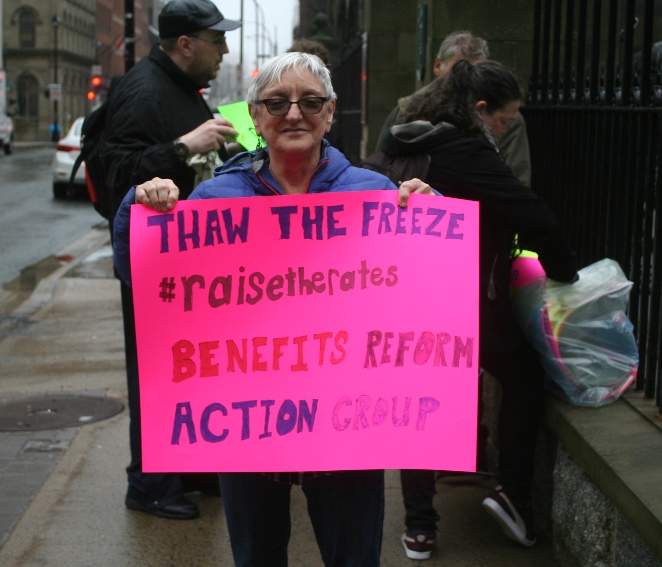Vince Calderhead is a human rights lawyer who lives and works in Halifax.
KJIPUKTUK (Halifax) – Last month’s Nova Scotia election budget found money to provide tax cuts for the middle class and businesses but not a single additional penny to the poorest of the poor; people who depend on social assistance to survive (70% of whom have disabilities). As Robert Devet and others have reported, when inflation is taken into account, social assistance recipients have effectively had tens of dollars per month cut from their income.
What makes the Budget speech especially galling is the passage that proudly announces: “We have worked hard together as Nova Scotians to reach this point. Now we will work even harder to ensure all Nova Scotians share the benefits……we are committed to taking steps that will make life more affordable for Nova Scotians.” Indeed, the Budget claims that there’ll be “More for those who need it most.” Sheesh…it would appear that, in the Province’s eyes, poor people aren’t actually Nova Scotians! The poor don’t count.

To fully appreciate the latest slight toward those living in poverty, the Budget needs to be seen within a broader context of poverty in Nova Scotia, making the complete failure to address the income support needs of the poorest of the poor especially callous.
In 2015, a study on child and family poverty in Nova Scotia found that 1/3 of children in Cape Breton were living in poverty; this rises to 43% for children under age six. In the same year, another study reported that Halifax ranks as the most food-insecure city among all provinces in Canada.
Most recently, a just released food costing report—the 7th in a series—lays out how social assistance budgets are hundreds and hundreds of dollars per month below a level which would permit individuals and families to eat a basic nutritional diet. (A family of four reliant on assistance faces a deficit of almost $1,000/mo. in paying basic expenses—including a minimally nutritious diet).
That’s right; things are at a point where serious discussion has moved well beyond any question about ‘the poor having enough if they just made better choices’.
Taking account of inflation, social assistance rates for a single person in Nova Scotia reached their high point in, wait for it, 1989. So much for those who speak vaguely of slow, gradual improvements in social policy.
We know that such scandalous treatment not only demeans us as a society—inasmuch as it’s carried out in our name—but also results in higher health care and criminal justice system costs. In short, depriving the poor of an adequate income is, and always has been, a false economy. Some of us remember the old Fram oil filter commercial, the tag line of which was: ‘You can pay now or pay [a helluva lot more] later.’
All of this is not just atrocious social policy, short-sighted fiscal policy but also represents a significant human rights violation. In February 2016, the United Nations human rights treaty body which monitors Canada’s compliance with its human rights obligations toward the poor regarding rights to social security, food, health and housing came close to using undiplomatic and caustic language in its criticisms of social assistance rates in Canada—including Nova Scotia.
Some real world examples
Newfoundland and Labrador
Within Canada, even a have-not province such as Newfoundland and Labrador, has made choices that result in people living in poverty being far better off than elsewhere. In fact, in the case of single parents, the Caledon Institute reports that the social assistance rates in Newfoundland put them above the main poverty-line recognized in Canada. This is the only jurisdiction in Canada to do so. For other family sizes as well Newfoundland routinely provides more dignity to the poor than other provinces.
Canadian Seniors
While there has recently been some backsliding, the main anti-poverty success story in Canada has been the experience of Canadian seniors whose poverty rate was, for decades, around 30% but dropped to 3.9% by 1995. What happened? The Federal government chose to improve Canada’s pension system—including the ‘Guaranteed Income Supplement’ in the 1960s effectively lifting hundreds of thousands of seniors out of poverty. (To see a graphic and current example of the difference which receiving a federal low-income pension makes in the ability to afford a nutritious diet, see the table setting out the situation of a lone-senior on page 26 of the recent FoodARC food-costing report). Afraid of turning 65?—not if you are in your early 60s, disabled and on social assistance.
Denmark
I visited Denmark last autumn for a couple of weeks and took advantage of the holiday to arrange a meeting with some faculty at the Copenhagen University law school. I wanted to ask how the course that I have taught for years at Dalhousie compares with what is offered in Denmark—essentially, to talk shop.
They had set aside an hour for the meeting.
I spent the first 10 minutes introducing myself, explaining my legal work with low-income people in Nova Scotia , as well as giving an overview of my ‘Poverty Law and Human Rights’ course at Dalhousie. (These courses are pretty much standard fare at law schools across North America.)
With anticipation, I turned to them and asked, “So, what’s your course like? Please… tell me all about it.”
There was a pause for quite a few seconds, before the senior faculty member spoke up and quietly said: “Uuuum, we actually don’t have a ‘Poverty Law’ course ….basically, because we don’t have poverty in Denmark, or in any of the Nordic countries.” After recovering, I asked some follow-up questions about what they meant by ‘poverty’ (while all low-income people have their needs fully met, Danes measure it as income inequality). The bottom line is that for a single person on social assistance in Denmark, and apart from the fact that they’d have free housing, their cash entitlement would be about five times what Nova Scotia has chosen to provide to a single person.
Yes, Denmark also has one of the highest tax rates in Europe, but we heard nobody grumbling about it. Surveys routinely report that Danes rank #1 in the world for happiness. Productivity growth, happiness, social justice and respect for basic human rights are, it turns out, closely related.
By about the 24 minute mark of my meeting with the Danish law profs, I was asking them for sightseeing tips for Copenhagen. Moving on.
Not in our name
So, yeah, the whole thing is doable. The Margaret Thatcher/Ronald Regan/Stephen Harper view that ‘there is no alternative’ to austerity is gone. Despite what you often hear by those resigned to (or privileged by?) the status quo, Nova Scotia has plenty of wealth; it’s all about making choices, it’s about how it will be shared.
There is simply no excuse for all this in a wealthy country. A hundred or two hundred years ago, it might have been said that there was not enough to go around; that the existence of poverty was ‘natural’, inevitable. But, as the great Nelson Mandela once stated:
“Like slavery and apartheid, poverty is not natural. It is man-made and it can be overcome and eradicated by the actions of human beings….And overcoming poverty is not a gesture of charity. It is an act of justice. It is the protection of a fundamental human right, the right to dignity and a decent life.”
Our governments make decisions that effectively maintain the level of poverty that we see, and that tens of thousands of our neighbours experience. This realisation – that the inequality in our society is actually a political decision — raises hard questions.
These are questions not just for our political leaders but also for ourselves as members of a society that repeatedly select politicians who by their choices, maintain poverty and malnutrition.
In the same way that we like to tell ourselves that we won’t tolerate racism, won’t tolerate sexism, homophobia or ableism, when are we, as a society, going to tell our political candidates and leaders that we will not tolerate poverty in our society, that, for starters, we want a right to an adequate standard of living enshrined in our Human Rights Act?
Poverty in Nova Scotia—not in our name!
For voters concerned about social justice and human rights, the question which they should ask is: which political party comes closest to proposing a truly inclusive and human rights compliant vision for Nova Scotia?
A government budget that devotes not a damn cent to improving social assistance….oh my!
If you can, please support the Nova Scotia Advocate so that it can continue to cover issues such as poverty, racism, exclusion, workers’ rights and the environment in Nova Scotia. A pay wall is not an option since it would exclude many readers who don’t have any disposable income at all. We rely entirely on one-time donations and a tiny but mighty group of kindhearted monthly sustainers.




Well written and eye opening. I have always relished the fact that I am Canadian and a proud Nova Scotian….not so sure any more…
I would wonder what the four political party leaders would have to say, if presented with the Danish model at one of their debates…All I can say is, “shame on us”.
Rod Hadley
Presenting these ideas at candidates’ forums and on the doorsteps would be an excellent use of Vince’s contributions here. That’s what I plan to do with this. Thanks for the idea, Rod!
Katherine Reed
Oops lots of typos above – a bit too enthusisatic with my response, couldn’t find the edit button. Please post this edited version below.
I now live in the California and what I hear most commonly, from well meaning people, is that small countries with mostly mono ethnic populations, can have these kinds of benefits, but theyre not doable or sustainable in a large modern society like the US. I don’t believe this to be true of course, but some arguments to addess comparable economies would be useful. I was also in Sweden a few weeks ago; the taxi driver who spoke excellent English, didnt understand the term homeless or indeed the concept of it when I explained that homeless means having no shelter, no place to live. He just shook his head in amazement. And youre right, several Danes I spoke with about their taxes would state that they were very high, then a few moments later would say, ” but we get a lot for our money.”